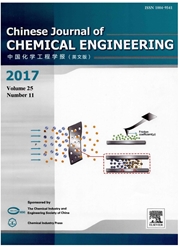

 中文摘要:
中文摘要:
Ni supported on bentonite was prepared by the impregnation method with different nickel contents, applied to the hydrogenation of nitrobenzene to aniline in a fixed-bed reactor, and it was characterized by X-ray diffraction(XRD), H2-temperature programmed reduction(H2-TPR), and X-ray photoelectron spectrometry(XPS). The results showed that Ni/bentonite catalyst with 20 wt% nickel content provided a higher conversion of nitrobenzene and selectivity of aniline compared to other catalysts. Ni O was the precursor of the active component of the catalyst, and the small crystallite size as well as the highly dispersed Ni O on the Ni/bentonite-20 catalyst, contributed to the catalytic performance. The hydrogenation of nitrobenzene was carried out at 300 °C with a H2 gaseous hourly space velocity of 4800 ml·(g cat)-1·h-1and a nitrobenzene liquid hourly space velocity of4.8 ml·(g cat)-1·h-1over Ni/bentonite-20. A 95.7% nitrobenzene conversion and 98.8% aniline selectivity were obtained. While the nitrobenzene liquid hourly space velocity was 4.8 ml·(g cat)-1·h-1, the yield of aniline was more than 95.0% during a 10-hour reaction.
 英文摘要:
英文摘要:
Ni supported on bentonite was prepared by the impregnation method with different nickel contents, applied to the hydrogenation of nitrobenzene to aniline in a fixed-bed reactor, and it was characterized by X-ray diffraction(XRD), H2-temperature programmed reduction(H2-TPR), and X-ray photoelectron spectrometry(XPS). The results showed that Ni/bentonite catalyst with 20 wt% nickel content provided a higher conversion of nitrobenzene and selectivity of aniline compared to other catalysts. NiO was the precursor of the active component of the catalyst, and the small crystallite size as well as the highly dispersed NiO on the Ni/bentonite-20 catalyst, contributed to the catalytic performance. The hydrogenation of nitrobenzene was carried out at 300℃ with a H_2 gaseous hourly space velocity of 4800 ml·(g cat)^-1·h^-1and a nitrobenzene liquid hourly space velocity of4.8 ml·(g cat)^-1·h^-1 over Ni/bentonite-20. A 95.7% nitrobenzene conversion and 98.8% aniline selectivity were obtained. While the nitrobenzene liquid hourly space velocity was 4.8 ml·(g cat)^-1·h^-1, the yield of aniline was more than 95.0% during a 10-hour reaction.
 同期刊论文项目
同期刊论文项目
 同项目期刊论文
同项目期刊论文
 期刊信息
期刊信息
